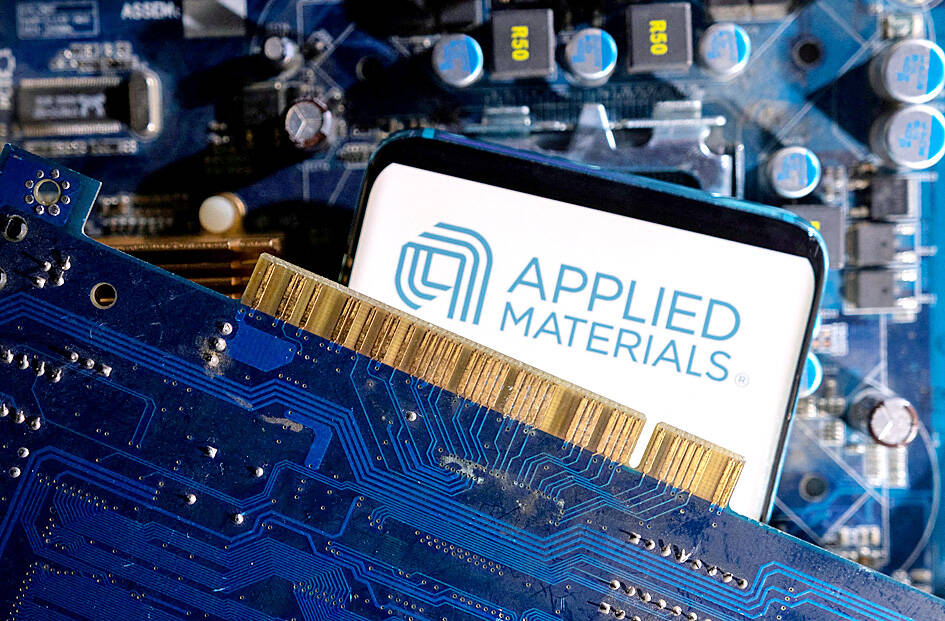Applied Materials Inc, the largest US maker of chipmaking machinery, failed to impress investors with its latest forecast following a rally in its shares this year.
Third-quarter sales would be roughly US$6.65 billion, the company said on Thursday.
Although that topped the average Wall Street estimate, some analysts had predicted revenue as high as US$7.13 billion.

Photo: Reuters
Excluding some items, profit would be US$1.83 to US$2.19 a share in the three-month period, which runs through July, while analysts had projected US$1.98.
Investors have been looking to Applied Materials for signs that a chip recovery is well under way. The company is a major supplier to Taiwan Semiconductor Manufacturing Co (TSMC, 台積電), Samsung Electronics Co and Intel Corp. That makes its outlook an indicator of demand in a crucial part of the electronics supply chain.
The company’s shares fell 1.5 percent in extended trading. They had earlier closed at US$214.17 in New York on Thursday, leaving the stock up 32 percent for the year.
Second-quarter profit was US$2.09 a share, excluding some items, while revenue amounted to US$6.65 billion.
Analysts had estimated earnings of US$1.99 and sales of US$6.52 billion.
Demand for machines used to manufacture artificial intelligence processors is growing, Applied Materials said.
However, some customers that make semiconductors used in internet-connected appliances, communications, cars, power electronics and sensors are pausing orders while they install machinery that they have already received, the company said.
“Near term, there will be some digestion,” Applied Materials CEO Gary Dickerson said. “This year is not going to be significant growth year for us.”
Dickerson said he is extremely bullish about the prospects for AI-related chips and predicts that such processors would soon overtake the smartphone and PC industries in terms of silicon consumed.
China accounted for 43 percent of the company’s revenue last quarter. Similar to some peers, Applied Materials is benefiting from huge investments by Chinese companies — part of Beijing’s efforts to carve out greater independence in the production of vital electronic components.
While US companies are restricted from supplying the most advanced manufacturing gear to China, they are getting a flood of orders for equipment used to make simpler types of chips, such as semiconductors that typically go into cars and industrial machinery.
The rapid increase in orders has stoked concern among investors, who fear that geopolitical tensions might cut off that source of growth.
Washington and the EU have already placed restrictions on the export of cutting-edge machinery, but officials are now worried that China might gain an edge in the manufacturing of certain less-advanced chips.
“We see China staying resilient,” Dickerson said, but added: “You’re not going see the growth rate you’ve seen over the last couple of years.”

Semiconductor business between Taiwan and the US is a “win-win” model for both sides given the high level of complementarity, the government said yesterday responding to tariff threats from US President Donald Trump. Home to the world’s largest contract chipmaker, Taiwan Semiconductor Manufacturing Co (TSMC, 台積電), Taiwan is a key link in the global technology supply chain for companies such as Apple Inc and Nvidia Corp. Trump said on Monday he plans to impose tariffs on imported chips, pharmaceuticals and steel in an effort to get the producers to make them in the US. “Taiwan and the US semiconductor and other technology industries

SMALL AND EFFICIENT: The Chinese AI app’s initial success has spurred worries in the US that its tech giants’ massive AI spending needs re-evaluation, a market strategist said Chinese artificial intelligence (AI) start-up DeepSeek’s (深度求索) eponymous AI assistant rocketed to the top of Apple Inc’s iPhone download charts, stirring doubts in Silicon Valley about the strength of the US’ technological dominance. The app’s underlying AI model is widely seen as competitive with OpenAI and Meta Platforms Inc’s latest. Its claim that it cost much less to train and develop triggered share moves across Asia’s supply chain. Chinese tech firms linked to DeepSeek, such as Iflytek Co (科大訊飛), surged yesterday, while chipmaking tool makers like Advantest Corp slumped on the potential threat to demand for Nvidia Corp’s AI accelerators. US stock

The US Federal Reserve is expected to announce a pause in rate cuts on Wednesday, as policymakers look to continue tackling inflation under close and vocal scrutiny from US President Donald Trump. The Fed cut its key lending rate by a full percentage point in the final four months of last year and indicated it would move more cautiously going forward amid an uptick in inflation away from its long-term target of 2 percent. “I think they will do nothing, and I think they should do nothing,” Federal Reserve Bank of St Louis former president Jim Bullard said. “I think the

SUBSIDIES: The nominee for commerce secretary indicated the Trump administration wants to put its stamp on the plan, but not unravel it entirely US President Donald Trump’s pick to lead the agency in charge of a US$52 billion semiconductor subsidy program declined to give it unqualified support, raising questions about the disbursement of funds to companies like Intel Corp and Taiwan Semiconductor Manufacturing Co (台積電). “I can’t say that I can honor something I haven’t read,” Howard Lutnick, Trump’s nominee for commerce secretary, said of the binding CHIPS and Science Act awards in a confirmation hearing on Wednesday. “To the extent monies have been disbursed, I would commit to rigorously enforcing documents that have been signed by those companies to make sure we get